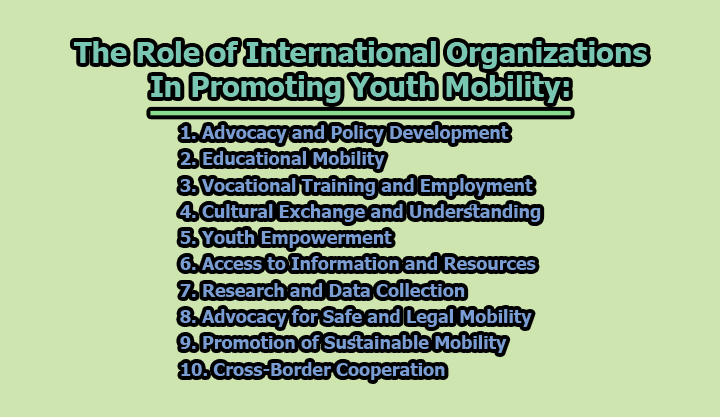The Role of International Organizations in Promoting Youth Mobility:
The role of international organizations in promoting youth mobility is significant and multifaceted. Youth mobility refers to the movement of young people across national borders for various purposes, such as education, work, cultural exchange, and volunteer activities. International organizations play a crucial role in facilitating and enhancing youth mobility in several ways:
1. Advocacy and Policy Development: International organizations often play a central role in advocating for policies and frameworks that facilitate youth mobility. They use their global presence and influence to push for the development and implementation of policies that promote the movement of young people across borders. Here are some key aspects of their advocacy and policy development:
a) Visa Simplification: International organizations work towards simplifying visa processes for young people. This can involve advocating for reduced visa fees, shorter processing times, and clearer guidelines for visa applications, making it easier for young individuals to travel and explore educational and work opportunities in other countries.
b) Recognition of Qualifications: Many international organizations advocate for the recognition of academic qualifications and work experience obtained abroad. This recognition ensures that the education and skills acquired by young people in foreign countries are acknowledged and valued by their home countries, making it easier for them to integrate into the local workforce upon their return.
c) Scholarships and Funding: These organizations often offer scholarships and funding opportunities for young people to pursue education and training abroad. Scholarships can significantly lower the financial barriers to international education, enabling youth from diverse backgrounds to access quality education in other countries.
d) Promotion of Cultural Exchange: They encourage cultural exchange programs that promote understanding, tolerance, and diplomacy among young people from different cultures and backgrounds. These programs help break down stereotypes and prejudices, fostering global citizenship and promoting peace.
e) Global Networking: International organizations serve as platforms for global networking and information sharing. They bring together stakeholders from different nations, such as government officials, educators, and youth representatives, to discuss and develop policies that support youth mobility.
2. Educational Mobility: Educational mobility is a core component of youth mobility, and international organizations play a crucial role in facilitating and promoting this aspect. Here’s how they contribute to educational mobility:
a) Scholarship Programs: Organizations like the European Union’s Erasmus+ program and the United States’ Fulbright Program provide scholarships for students to study abroad. These scholarships cover tuition, living expenses, and sometimes even research grants, making international education accessible to a wide range of young individuals.
b) Quality Assurance: International organizations often set standards for educational quality and accreditation. This ensures that educational institutions worldwide maintain high standards, making it more attractive for students to seek education in foreign countries with confidence in the quality of their programs.
c) Support Services: Many international organizations offer support services to international students. This includes assistance with visa applications, orientation programs, and guidance on adapting to new academic and cultural environments. These services help students transition smoothly into their host countries.
d) Cross-Cultural Learning: Educational mobility allows young people to experience different cultures, teaching them valuable life skills such as adaptability, open-mindedness, and intercultural communication. These experiences contribute to a more globally aware and culturally competent generation.
e) Research Collaboration: International organizations often promote research collaboration across borders, encouraging young researchers to participate in global research projects. This not only expands their knowledge but also fosters international collaboration in areas of mutual interest.
3. Vocational Training and Employment: International organizations play a pivotal role in creating opportunities for youth to gain international work experience and vocational training. Here are some specific ways they contribute:
a) Job Placement Programs: Initiatives like the European Solidarity Corps and the United Nations’ Youth Employment Initiative connect young people with internships, volunteer work, and job opportunities across the globe. These programs address youth unemployment by providing valuable work experience.
b) Skills Development: International organizations may partner with governments and private sector entities to provide training and skill development programs that align with the needs of the job market. This ensures that young individuals acquire the skills that are in demand globally.
c) Global Networking: These organizations create networks and platforms for young job seekers to connect with potential employers, share experiences, and seek career advice. This networking can be crucial for young people looking to launch their careers on an international scale.
d) Entrepreneurship Support: International organizations often promote entrepreneurship among young people. They provide resources, mentorship, and funding opportunities to encourage the establishment of innovative startups and small businesses.
e) Global Work Experience: Working abroad provides young people with a unique perspective on different work cultures, management styles, and business practices. This experience can be invaluable for personal and professional growth.
4. Cultural Exchange and Understanding: Cultural exchange is a powerful tool for promoting youth mobility and enhancing mutual understanding. International organizations support these programs in the following ways:
a) Exchange Programs: Programs like the U.S. Department of State’s Youth Exchange and Study (YES) program bring young people from diverse backgrounds together. They live with host families, attend school, and participate in community activities, which promote direct cultural immersion and understanding.
b) Language Learning: Many cultural exchange programs include language courses, which not only help participants communicate effectively but also immerse them in the cultural nuances of the host country. Language skills acquired during these exchanges are valuable for future international opportunities.
c) Interpersonal Relationships: Cultural exchange fosters personal relationships and friendships across borders, breaking down stereotypes and promoting tolerance and peace. Young participants often return home with a broader and more inclusive perspective on the world.
d) Promotion of Diplomacy: Cultural exchange initiatives are often seen as a form of “soft diplomacy,” as they create positive connections between countries and their people. This can improve international relations and cooperation.
e) Cross-Cultural Competence: Participating in cultural exchange programs equips young people with cross-cultural competence, a skill that is increasingly valuable in a globalized world. It can be an asset in both personal and professional life.
5. Youth Empowerment: Empowering youth to take an active role in their communities and on the global stage is a key focus of many international organizations. Here’s how they support youth empowerment:
a) Resources and Training: International organizations offer resources and training programs that equip young individuals with the skills and knowledge they need to take on leadership roles and become active agents of change.
b) Youth Forums and Conferences: They organize events and conferences where young people can discuss and address global issues, share their perspectives, and propose solutions. These forums provide a platform for youth to influence decision-making.
c) Advocacy for Youth Rights: Many international organizations advocate for the rights of young people, including access to education, employment, healthcare, and participation in political processes. They work to ensure that the voices and needs of young individuals are heard and respected.
d) Support for Youth-led Initiatives: These organizations often fund and support youth-led projects and initiatives aimed at addressing social and environmental challenges. This support enables young people to make a meaningful impact in their communities and beyond.
e) Mentorship and Networking: International organizations create mentorship programs and networking opportunities that connect young individuals with experienced professionals and leaders. This mentorship fosters personal and professional growth and helps young people realize their potential.
6. Access to Information and Resources: International organizations serve as valuable hubs of information and resources for young people seeking opportunities for mobility, such as studying, working, or volunteering abroad. Here’s how they facilitate access to these resources:
a) Comprehensive Databases: International organizations often maintain extensive databases of scholarships, exchange programs, and job opportunities for young people. These databases are accessible online, making it easier for youth to find and apply for relevant opportunities.
b) Websites and Platforms: Many organizations offer dedicated websites and platforms where young people can search for opportunities, access guidance on application procedures, and find information on various countries’ education systems and work regulations.
c) Guidance and Counseling: Some international organizations provide guidance and counseling services to help young individuals navigate the complexities of international mobility. This support can include assistance with visa applications, choosing the right educational institution, and understanding cultural nuances.
d) Financial Aid and Grants: In addition to scholarships, some organizations provide information on financial aid, grants, and funding options that can assist young people in covering the costs associated with mobility.
e) Online Communities: International organizations may host online communities and forums where young people can connect with peers who have had similar mobility experiences. These platforms provide a space for sharing insights and tips, as well as fostering a sense of community among young travelers.
7. Research and Data Collection: International organizations frequently conduct research on youth mobility trends and the impact of mobility programs. This research serves various purposes:
a) Policy Development: The research findings contribute to evidence-based policy development. Governments and organizations can use this data to design more effective and targeted programs that align with the evolving needs and aspirations of young people.
b) Program Improvement: The data collected on the experiences and outcomes of young individuals engaged in mobility programs helps organizations refine their initiatives, ensuring they remain relevant and meet the expectations of participants.
c) Trend Analysis: Research on youth mobility trends allows organizations to stay ahead of changing preferences and global dynamics, ensuring they can adapt their offerings to address emerging challenges and opportunities.
d) Publication and Dissemination: International organizations often publish research reports and findings, making them accessible to a wide audience. This promotes transparency and helps stakeholders, including young people, understand the impact of mobility programs.
e) Data-Driven Advocacy: Data on youth mobility can be used for advocacy efforts, providing concrete evidence of the positive impact of mobility on young people’s personal and professional development.
8. Advocacy for Safe and Legal Mobility: International organizations prioritize the safety and legality of youth mobility, particularly in the context of migration and refugee issues. Their advocacy efforts in this area are crucial:
a) Human Rights Protection: International organizations work to protect the rights and well-being of young migrants and refugees. They advocate for safe and humane treatment, access to education, healthcare, and opportunities for self-reliance.
b) Awareness and Education: These organizations often raise awareness about the challenges and vulnerabilities faced by young migrants and refugees. They educate governments, the public, and relevant stakeholders about the importance of safeguarding the rights and dignity of these vulnerable populations.
c) Policy Influence: Through their global reach, international organizations influence national and international policies related to migration and refugee issues, advocating for laws and regulations that protect and support young migrants and refugees.
d) Collaboration with Governments: They collaborate with governments to create legal pathways for youth mobility, ensuring that young people can travel and seek refuge in a safe and lawful manner.
e) Support for Integration: International organizations offer support programs that facilitate the integration of young migrants and refugees into host countries, ensuring that they have access to essential services and opportunities for personal and professional development.
9. Promotion of Sustainable Mobility: In a world increasingly concerned about environmental sustainability, international organizations are also promoting sustainable youth mobility. Here’s how:
a) Eco-Friendly Travel: These organizations encourage young people to adopt eco-friendly travel practices, such as using public transportation, reducing carbon emissions, and making sustainable choices during their journeys.
b) Sustainable Development Initiatives: Many organizations support projects and initiatives that focus on sustainable development. Young individuals are encouraged to engage in activities that contribute to social, economic, and environmental sustainability while gaining valuable experience.
c) Environmental Education: International organizations may offer educational programs on environmental conservation and sustainability, fostering an understanding of global environmental challenges and encouraging eco-conscious behavior among youth travelers.
d) Participation in Conservation Efforts: Some mobility programs offer opportunities for young people to participate in conservation and environmental protection projects. These experiences not only support ecological causes but also contribute to personal growth and global awareness.
e) Recognition of Sustainable Practices: International organizations recognize and reward young individuals and projects that prioritize sustainability in their mobility activities, encouraging the adoption of responsible and environmentally friendly practices.
10. Cross-Border Cooperation: Regional international organizations play a key role in promoting cross-border cooperation and agreements that ease travel restrictions and facilitate youth mobility within their respective regions. Here’s how they contribute to this aspect:
a) Visa-Free Travel: Some regional organizations work towards agreements that allow young people within the region to travel without the need for visas or with simplified visa processes, making mobility more accessible.
b) Recognition of Educational Qualifications: Cross-border cooperation often includes agreements related to the recognition of educational qualifications, making it easier for students to transfer credits and degrees between institutions in different countries.
c) Employment Mobility: Regional organizations may promote cross-border employment opportunities, allowing young people to work in neighboring countries with ease.
d) Youth Exchange Programs: These organizations often organize regional youth exchange programs, facilitating cultural exchange, language learning, and cooperation among young people from different countries in the region.
e) Infrastructure Development: Cross-border cooperation may involve the development of infrastructure and transportation networks that make it simpler for young people to travel within the region.
In conclusion, international organizations play a pivotal role in promoting youth mobility by advocating for policies, providing resources and opportunities, fostering cultural exchange, and supporting youth in their quest for education, work, and personal development on a global scale. Their efforts contribute to a more interconnected and intercultural world, where young people can gain valuable experiences and contribute to positive change in their own communities and on the global stage.

Library Lecturer at Nurul Amin Degree College










